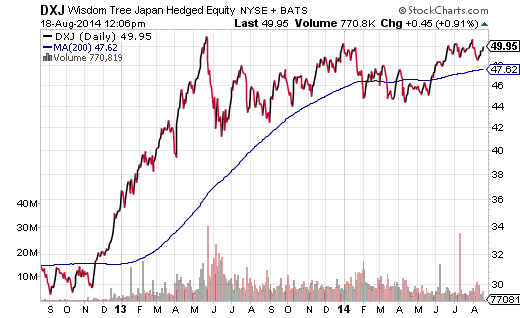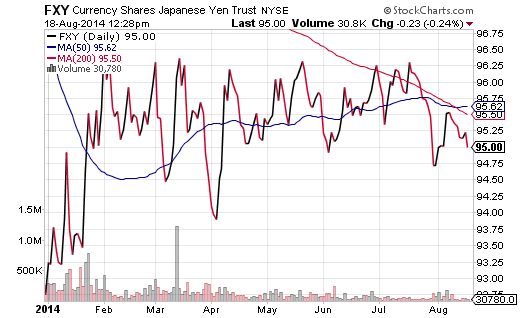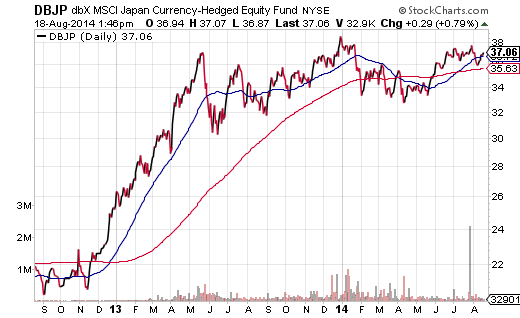Several months before Shinzo Abe took office as the Prime Minister of Japan, the pre-ordained leader had expressed a fierce determination to jump start Japan’s economy through unconventional monetary policy measures. Like the U.S. Federal Reserve, the Bank of Japan would electronically create yen to acquire less liquid assets, such as government bonds.
For a six-month stretch (11/16/2012-5/15/2013), Japanese stocks rocketed alongside speculative support for the yen creation trade. WisdomTree Japan Total Dividend (NYSE:DXJ) and iShares MSCI Japan (NYSE:EWJ) logged 67.5% and 41.2% respectively. In spite of the remarkable run-up, however, Japanese equities flat-lined over the 15 months that followed.
Naturally, if anyone were able promise you a 21-month or two-year return in the neighborhood of 65%, you would not care if it happened in a flash or in a gentle uptrend. Nevertheless, it is difficult to look at 18 months of futility as a sign that Japan’s quantitative easing efforts are still creating a “wealth effect” that inspires longer-term confidence in “Abenomics.”
Consider the yen via CurrencyShares Japanese Yen (ARCA:FXY) in 2014. With all of the liquidity that the BOJ had supposedly pumped into the country’s economy – with the U.S. Federal Reserve scaling back on its asset purchases in a modest effort of de facto tightening – with one of the worst contractions in Japan’s GDP in many years – wouldn’t one expect FXY to fall further in value? Instead, it is holding onto modest gains achieved early in the year.
Granted, investments from the yen to the dollar to German bunds to Gold to U.S. Treasuries have all benefited from ‘risk-off’ demand year-to-date. Blame it on a five-and-a-half-year equity bull market or even profit taking on perceived overvaluation. Heck, express concern about the sheer number of military engagements in geopolitical hot spots around the world. Yet it is also possible that the yen’s 25% slide has run its course until the BOJ decides to create more electronic money. And if yen short sellers or Japanese equity owners had any sway over bureaucratic decision-making, more yen would be swirling about and benefiting Japanese exporters today.
Unfortunately, Japan has several additional problems when it comes to worldwide investor desire to own shares in its corporations. For one thing, few people seem to believe that economic growth can be sustained in a country where aging demographics and the worst debt-to-GDP ratio in the developed world exists. It follows that foreigners tend to think short-term when investing in the Nikkei Index, especially after its quarter-century of futility. Secondly, Japanese citizens have been growing resentful of wealthier people and corporate shareholders benefiting from the asset price inflation, while they themselves do not feel that they’re escaping the grips of recessionary pressures. (Hmmmmm… there’s a sentiment that sounds familiar.)
Still, before prospective ETF investors abandon the idea of profiting from a second wave higher for Japanese stocks, they should consider two factors. First, the Bank of Japan admits to doing something that the U.S. Fed says that it does not; that is, the electronic yen is purchasing stock ETFs like EWJ, not government or quasi-government bonds alone. Recently, WSJ.com reported that Japan’s central bank acquired approximately $904 million in ETFs in the first six days of August. Is it a coincidence that these purchases occurred in early August? Probably not. Remember, the month of July had all the markings of a global correction.
Putting all of the information into perspective, then, the Bank of Japan is willing to make certain that its stock market does not fall too far through the purchase of stock ETFs. Second, the extent of economic weakness in the country increases the probability that the BOJ will eventually succumb to additional electronic money printing activity. Third, when safety-seeking is not the predominant theme, the yen is highly likely to lose value. Even in a market where corporate profits and revenue are modest, hedged currency gains could supercharge stock ETFs like DXJ.
Am I currently invested in Japanese equities? Admittedly, I am not. I prefer to wait for a more substantive pullback for all stock assets before committing to an area where the best one can really say is that the yen should depreciate. I would also prefer to see a significant breakout above the May 2013 highs for DXJ. db-X MSCI Japan Curr. Hedged Eq (NYSE:DBJP) is another viable possibility. Its most recent high occurred at the end of 2013.



